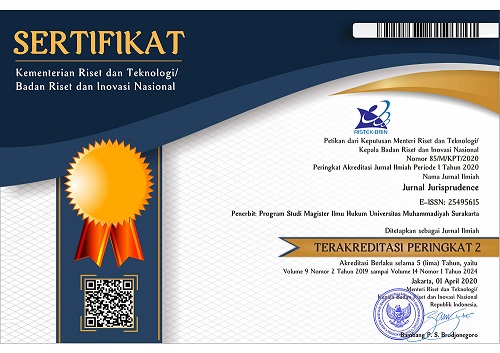Judge Considerations Of The Corruption Decision Of Social Aid For Covid-19 Disaster Mitigation From The Perspective Of Anti-Corruption Principles
DOI:
https://doi.org/10.23917/jurisprudence.v12i1.771Keywords:
Anti-Corruption Principles, Covid-19 Disaster Mitigation, Court, DecisionAbstract
Purpose of the study (Tujuan): The purpose of this study is to analyze the judge's judgment on the corruption decision of the social aid for COVID-19 disaster mitigation from the perspective of anti-corruption principles.
Methodology (Metodologi): This research method employed normative research, sourced from primary legal materials, secondary legal materials, and non-legal materials.
Results (Temuan): anti-corruption principles which include accountability, transparency, fairness, policy, and policy control, are to prevent external factors causing corruption. Regarding the COVID-19 disaster mitigation, early prevention and disaster mitigation are required as a series of efforts to reduce disaster risk, through both physical development and awareness and capacity building to encounter the threat of disasters. One of which is through social aid to the community due to the impact of the COVID-19 pandemic. Based on the review of the judge's decision No.29/Pid-Sus/TPK/2021/PN Jkt. Pst, what incriminated the defendant who was sentenced to 12 years in prison is a crime of corruption undertaken when the country combated the disaster emergency of the COVID-19 pandemic and the fact that the defendant was a state official who is supposed to be a good role model. Meanwhile, the mitigating factor is that the defendant has suffered enough due to the insults he received from the community even though the defendant is not necessarily guilty. Thus, this has hurt the sense of justice in society. Learning from the corruption case of social aid during the pandemic, judges considered that a leader should not violate the principles of anti-corruption morality so that the integrity of the anti-corruption leadership does not match expectations.
Applications of this study (Kegunaan): It is to give law enforcers insight on what types of judicial decisions may hurt society’s trust and sense of justice. It is to give a non-exemplary case of judicial decisions that failed to provide a deterrent effect to criminal actors.
Novelty/ Originality of this study: It provides an analysis on the judge's judgment on the corruption decision of the social aid for COVID-19 disaster mitigation from the perspective of anti-corruption principles
Downloads
Submitted
Accepted
Published
Issue
Section
License
Copyright (c) 2022 Jurnal Jurisprudence

This work is licensed under a Creative Commons Attribution 4.0 International License.

















